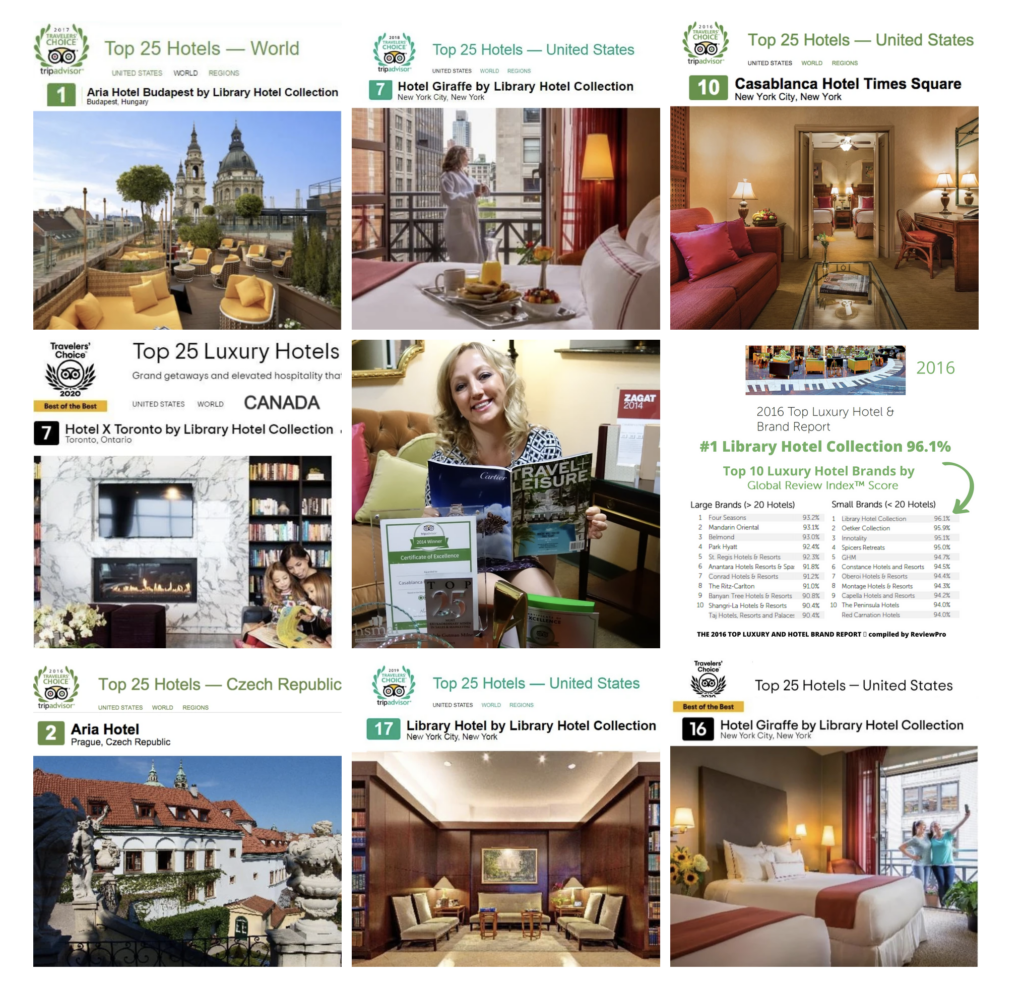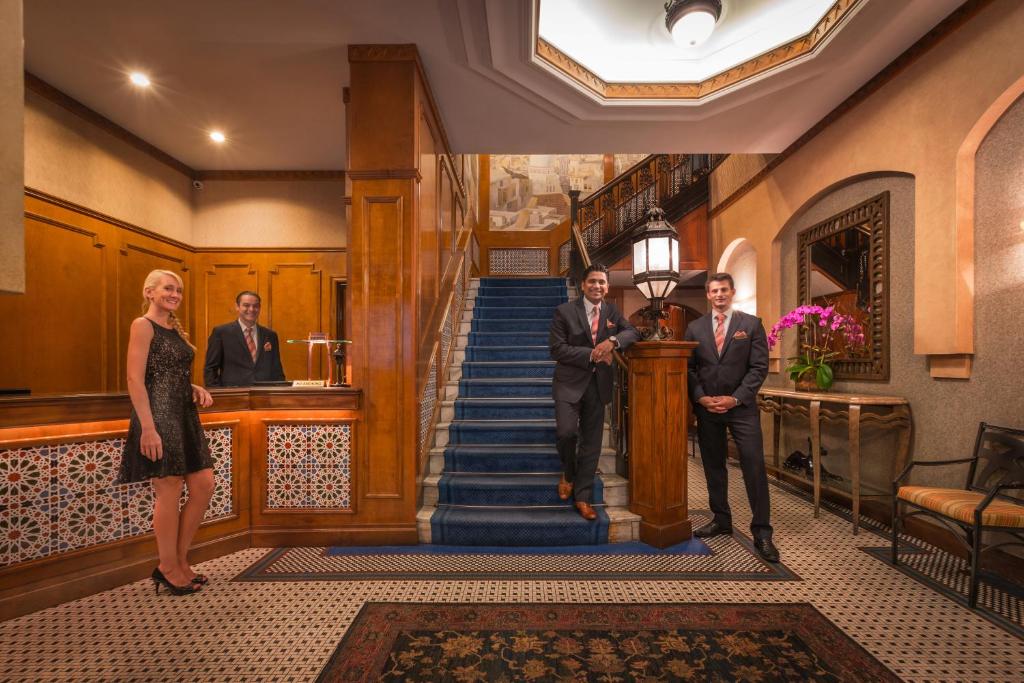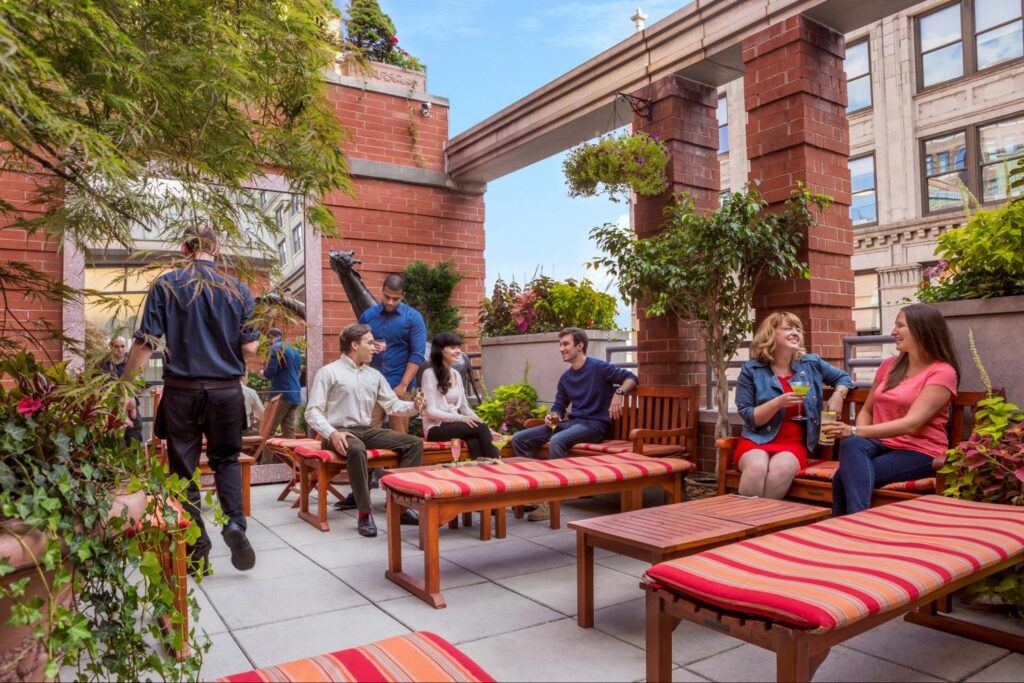Adele Gutman is done with “reputation management.”
“Responding to reviews with platitudes or having your night auditor or PR executive cut and paste responses is not going to improve your reputation one iota. It might look prettier, but it doesn’t actually make a difference.”
That’s why Adele is focused on what she calls “Reputation Cultivation.”
“The work I do to cultivate a good reputation not only creates guest loyalty but employee satisfaction because they feel they are successful at their job and that they’re growing. They’re happier because they don’t have to deal with so many problems at our hotels because we fix them when we see them.”
If anyone would know what they’re talking about, it’s Adele. During her tenure as Vice President of the Library Hotel Collection, the brand achieved the extraordinary result of placing all four of its New York City properties in the top four positions on TripAdvisor’s list of hotels with the highest guest satisfaction.

Through her leadership, the Library Hotel Collection also repeatedly earned the #1 highest online guest satisfaction rating of any luxury hotel brand in the world, receiving a 96.1% Global Review Index rating in the ReviewPro Luxury Brand Report, a survey of 2.7 million annual online reviews. Her work on driving revenue through improving guest experience earned recognition by HSMAI as one of the Top 25 Most Extraordinary Minds in Sales & Marketing.
To Adele, problems at hotels start when senior leaders feel that guest feedback isn’t important enough for them to be involved with or take action on.
Adele mentioned looking up the guest satisfaction scores of a large hotel chain that used to have a guest satisfaction rate between 78% and 80%. “Right now it’s dropped to 76%. That isn’t good. It’s not even average. It’s terrible! They have a problem and they don’t realize it. Even when you have 80% guest satisfaction that’s merely good. And good isn’t good. Only great is good. Their tolerance for losing guests due to lack of enthusiasm for the experience is too high. If we want guests to love us, and be loyal to us, we have to love them first.”
In this article, we cover:
Challenges in hospitality staffing today
Adele is worried about the challenge we face in staffing in hospitality today and used the example of a photo of a despondent chef that was circulating on social media.
“Scenes like these are happening in too many hospitality businesses,” she told me.
“Your staff has been in pain and maybe demand for hotels has increased, but the pain hasn’t been reduced for staff.”
Adele sees hotels still losing too many people. “It’s not that they don’t want to work, it’s that people aren’t feeling satisfied working in hospitality. They’re not feeling like they’re growing. They’re not feeling they have a work-life balance. If the chef is working 70 hours a week, and sacrificing their family time, their mental health, and their physical well-being, it’s not the fault of the guests being too demanding, wanting hot food hot and cold food cold. It means you need another chef. It also means you need to give them the support they need to be successful.”
Leading a workforce that inspires great reviews
Hotel leaders that lead their teams well will find employees are more engaged.
“When you work with passion and purpose in your focus on making sure the guest is having a great experience and you’re listening to your team and supporting them in facilitating solutions to problems instead of just letting them deal with those problems repeatedly, you’re going to have a completely different working environment. That’s the workforce that is going to inspire five-star reviews. That’s the environment that is going to inspire staff loyalty.”
In Adele’s experience, it’s easier to run a well-run hotel than a poorly-run hotel.
“Complaints crush the souls and energy of people.”
Listening and empowering staff
For Adele, empowering staff to speak freely is the most efficient way to both increase employee satisfaction and guest satisfaction.
“I want my teams to tell me when they’ve heard several guests complain about something. For them to tell me, ‘I think you may already know about the problem but I haven’t seen a solution. Are we dealing with this? Because it takes time away from serving our guests.’”

Great hoteliers don’t let problems fester
To highlight the opportunity, Adele shared a story of a recent hotel stay where her room key didn’t work to open the pool area. She had to wait until someone came to the front desk, and then talk to the maintenance person who was able to help her get to the pool.
A better approach? “I suggested they might have put up a sign that says ‘Please use the other door to the pool. Your key will work there because this one is malfunctioning.’ That way your staff doesn’t need to explain the situation over and over again. When I said this, the maintenance person suggested a better idea, to swap the door lock so that the functioning lock is on the door most people will use.”
“In talking to the maintenance person, it was clear he had known about the problem before me but didn’t solve it because no one asked him how might we solve this problem to cause less friction for guests. The result is it took 8 minutes out of my time and 8 minutes out of his time. Imagine the waste of 8 minutes times 30 days if one or two people complained each day about not being able to get into the pool with a room key.”
Great hoteliers don’t let problems fester.
“Too many people think they only need to look at the big picture and if 100 people complain about something for a year they’ll think about fixing it. But that’s like death by a thousand paper cuts. If you keep giving guests tiny little paper cuts throughout their experience engaging with your hotel, they may give you a four-star review because you have a beautiful property or your food is good, but they’re not in love with you because you’re not managing those details to ensure delight.”

Developing a culture of spotting – and fixing – problems
According to Adele, “You need to cultivate a culture where staff feel safe and encouraged and celebrated for bringing up observations and little problems like these that distract from the beautiful experience you want guests to have.”
Doing this boosts the morale of your team.
“Encouraging me to see and fix problems makes me feel I’m helpful. I’m successful. I’m a creative problem-solver. That my company needs me and appreciates me for my intellect.”
“You may not think about creativity and intellect when talking about a housekeeper or bellman but they are full of creativity that can be unlocked to the benefit of the hotel and your brand reputation as a whole.”
This is how you create experiences that guests share with their friends, Adele has observed. “It’s free advertising.”

Why you should “jump on the reputation cultivation train”
Adele has been a leading advocate of embracing guest feedback and employee feedback in a process she calls “the reputation cultivation train.”
“If we jump on that train that takes us everywhere we want to go. It leads to higher ADR. It leads to more frequent stays. It leads to more free publicity for the hotels. It creates more demand and decreases employee turnover.”
Innovation’s biggest opportunity is in culture and process
Something that puzzles Adele is how people immediately turn to technology any time they look for innovation.
“They think they can write a check and automatically problems will be solved. But culture is going to eat strategy for breakfast every day.”
“You can buy all the tools in the world but they won’t work as well as they should unless those tools are being used by a team on a mission.”

How Adele Gutman got her 4 NYC hotels in the top 4 places on TripAdvisor
Adele embarked on her journey of reputation cultivation when she was leading sales, marketing, and revenue as Vice President at the Library Hotel Collection in New York City.
“I was working for [Library Hotel Collection owner] Henry Kallan back in 2000, the year TripAdvisor was started. While I didn’t have awareness of TripAdvisor or guest reviews I remember always wanting to monitor what was said about our brand name and our hotels – making sure all the descriptions of our property and photos were accurate.
Early in her role, Adele quickly saw the significance of online reviews. She knew people would be more likely to believe what a former guest said about the hotel than anything that she had to say about her hotels.
“If there was a disparity between what I believed about the hotel and what the guest believes about the hotel, I needed to figure out a way to close that gap. I need to really understand what guests were saying, so if there are any problems I could identify the root cause and fix it.”
Her philosophy aligned closely with Henry Kallen’s philosophy that if every guest left their hotels happy, they would do the marketing for them. “That was before social media – we just knew that word of mouth is huge for hospitality businesses,” Adele recalled.
One day, she noticed one of her hotels had shot up to the #3 spot on TripAdvisor in New York City – a city with more than 500 hotels.
“I went over to speak with Nina Sullivan, the general manager of the Hotel Giraffe, and said congratulations. She told me how because of that ranking people were scrambling to get a reservation at the hotel. If we started the day with a lot of vacancies, we had sold them all without discounting by mid-afternoon because people wanted to stay at a hotel that earns great reviews. That was our Eureka moment.”
Back then, there wasn’t a VP of Operations at Library Hotel Collection, so Adele called all of their General Managers together, along with front-office managers and directors of sales, to discuss what they could do to build on this achievement.
“We told them we thought they are the best in the business. We told them that we had such great teams, and if one of our hotels could reach the top of the TripAdvisor rankings for New York, there shouldn’t be any reason why all of our hotels couldn’t be.”
This was the start of a shared mission: to cultivate a reputation that would earn reviews that would put all of their hotels at the top of TripAdvisor rankings. “We knew that it was free and it was the best form of advertising we could ever do.”
While somewhat obvious now, it wasn’t an obvious strategy back then. “A lot of people in the industry were bemoaning the fact that guests could leave public feedback. They were saying how awful it was that they lost control of the conversation and anyone could say anything about their hotels.”
Adele and her team saw it differently.
“We saw the opportunity for guests to leave public feedback as pure opportunity. All we had to do is love and listen to our guests.”

Collecting inspiration – and sharing it
With a shared mission in place, Adele had a request for her leaders.
“I told those in the room let’s go back to our teams and think about each part of the guest journey and what things we could do to deliver some kind of extra sparkle to our guests. I talked a lot about ‘sparkling sunshine’ on guests. I knew that when we did that, we can see the face of our guests just light up because they felt so cared for, respected, and appreciated.”
Adele asked her leaders to collect all the magical little things each team member did to create those moments of reaction and assemble them in a shared document everyone could access.
“We wanted to share stories and best practices of what great hospitality looks like. I wanted to talk about it every morning in our daily meeting. I wanted us to talk as a company about providing kindness and compassion morning, noon, and night.”
Tracking progress daily
With the goal of learning reviews that would put them on the top of TripAdvisor’s list, they also created a practice of looking at their ranking every day.
“We looked at other review sites too but TripAdvisor was our central focus. It took a little while but after a few years we had all of our properties in the top 10 and then only a little bit after that we were in the number one, number two, number three, and number four spots for New York City.”
Top of New York – and top of the country
The process Adele used to provide an experience that earned this type of recognition earned the recognition of TripAdvisor’s Travelers Choice awards, and three of their four properties earned spots in the top 25 list nationally.
“In the United States, we probably have 90,000 hotels. That’s an incredible achievement to earn that recognition.”
That ranking and recognition on the top of TripAdvisor in New York City continued year after year.
👉 Listen to Adele tell this story in audio form on Hospitality Daily: How The Library Hotel Collection reached #1 in the world

Inspiring others to cultivate their reputation
Today, Adele focuses on not only inspiring her story of reaching the top of your satisfaction rankings but implementing processes that ensure consistent excellence.
In Adele’s view, the process of reputation cultivation should involve general management, including sales and marketing – the whole commercial department. But it also needs to include owners. “If the general managers don’t believe in and support the process there’s only so much that employees can do on their own. It needs to be a team effort from the top down.”
“I hope I inspire people to make a change in the way they do things. What we did was just build a series of habits at any hotel can adopt to get similar results.”

Learn more about Adele Gutman here, follow her on LinkedIn, and subscribe to Get Great Guest Reviews here









